OPEN Visiting Fellowships
The OPEN Visiting Fellowship is a mutual learning and development opportunity for research and policy professionals. As Visiting Fellows, policy professionals have the opportunity to explore policy questions and challenges with research professionals in their Host Department and with others across the University; to co-convene workshops of interest to them, their colleagues and their Host Department, contributing to longer-term, institutional relationships; and to advise research professionals in their Host Department on approaches to policy engagement.
This year, ten academic departments across the University are hosting an OPEN Visiting Fellow from January to July.
If you have any questions about the OPEN Visiting Fellowship, please contact [email protected]
For more information on the OPEN Visiting Fellowship please contact Noora Kanfash.
The 2026 Visiting Fellows and their Academic Partners
This year ten University departments are hosting Visiting Fellows. Each Visiting Fellow is supported by one or more Academic Leads and by the University-wide Policy Engagement Team.
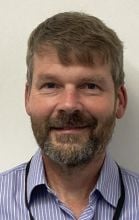
Paul Chambers and Sam Fankhauser
Paul Chambers is a senior civil servant in the Department of Energy Security and Net Zero where he leads work on non-domestic buildings within the net zero buildings and industry group. He has worked on climate change and energy policy for more than 20 years.
Sam Fankhauser is Professor of Climate Change Economics and Policy at the Smith School and the School of Geography and the Environment. He is interested in the policy interventions and governance arrangements that are needed for a smooth transition to net zero greenhouse gas emissions.
 Sam says ‘The Oxford Net Zero team is delighted to welcoming Paul Chambers as part of the OPEN Visiting Fellowship. It is a great opportunity to further strengthen our links with the UK Civil Service on Britain’s statutory journey towards net zero by 2050. As the debate around net zero intensifies, we will explore practical ways of decarbonising the UK economy in a way that is consistent with the science but also preserves economic prosperity and generates new opportunities. We will explore what “good” net zero standards and strategies look like and how the UK can lead by example.’
Sam says ‘The Oxford Net Zero team is delighted to welcoming Paul Chambers as part of the OPEN Visiting Fellowship. It is a great opportunity to further strengthen our links with the UK Civil Service on Britain’s statutory journey towards net zero by 2050. As the debate around net zero intensifies, we will explore practical ways of decarbonising the UK economy in a way that is consistent with the science but also preserves economic prosperity and generates new opportunities. We will explore what “good” net zero standards and strategies look like and how the UK can lead by example.’
Emily Mayhew and Megan Gooch
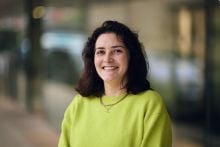 Emily Mayhew works at the Department of Culture Media and Sports in the Creative Industries and AI Directorate, responding to the changes and opportunities that AI brings to the UK’s creative and cultural landscape.
Emily Mayhew works at the Department of Culture Media and Sports in the Creative Industries and AI Directorate, responding to the changes and opportunities that AI brings to the UK’s creative and cultural landscape.
‘Together with Meg and her team we aim to deepen understanding across government of the impacts and opportunities that AI presents for the library and heritage sectors.’
 Megan Gooch is Head of the Centre for Digital Scholarship and Digital Humanities Support, based at the Bodleian Library. She is working on how AI is used in libraries, particularly around the impact of, and opportunities for AI for users accessing digital collections.
Megan Gooch is Head of the Centre for Digital Scholarship and Digital Humanities Support, based at the Bodleian Library. She is working on how AI is used in libraries, particularly around the impact of, and opportunities for AI for users accessing digital collections.
Thanuja Galhena and Nicole Grobert
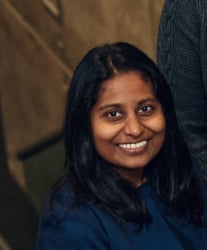 Thanuja Galhena is a UK civil servant, working in the Department for Business and Trade. Her current role focuses on attracting foreign investment into the UK Advanced Materials sector to drive growth and job creation, developing materials supply chains for advanced manufacturing in the UK and building necessary policy frameworks to support that. She is keen to use this OPEN Visiting Fellowship to provide established and aspiring academics with a closer understanding of parts of the government whose work influences the materials sector. This will provide a clearer picture on how University-level research in materials science fits into and impacts the big picture, and also benefit policy formation and organisational improvement in the Civil Service.
Thanuja Galhena is a UK civil servant, working in the Department for Business and Trade. Her current role focuses on attracting foreign investment into the UK Advanced Materials sector to drive growth and job creation, developing materials supply chains for advanced manufacturing in the UK and building necessary policy frameworks to support that. She is keen to use this OPEN Visiting Fellowship to provide established and aspiring academics with a closer understanding of parts of the government whose work influences the materials sector. This will provide a clearer picture on how University-level research in materials science fits into and impacts the big picture, and also benefit policy formation and organisational improvement in the Civil Service.
‘This fellowship will help strengthen the links between academic research and policymaking in a particularly important time where the UK’s Modern Industrial Strategy positions advanced materials as a foundational frontier industry in the Advanced Manufacturing Sector Plan to boost innovation, net-zero goals, and supply chain resilience’ says Thanuja.
Nicole Grobert works at the interface of research, science advice, and public policy, specifically in advanced materials and nanoscience, with a strong track record of high‑quality research, interdisciplinary collaboration, and academic leadership. Her work has contributed to the advancement of materials science while also shaping how emerging manufacturing technologies are assessed and governed. Alongside her academic achievements, Professor Grobert brings extensive experience in science governance and policy engagement. Between 2018 and 2025, she served as Member and Chair of the Group of Chief Scientific Advisors to the European Commission, leading interdisciplinary scientific advice at the highest levels and working closely with policymakers to ensure that robust, independent evidence informed strategic decision‑making.
‘Through the OPEN Visiting Fellowship, I’m aiming to deepen my engagement with UK policy communities, working with Dr Thanuja Galhena on advanced materials and manufacturing, while also exploring broader questions of innovation governance. The fellowship offers space for reflection, collaboration, and mutual learning, supporting the development of new partnerships for open and responsible policymaking.’
Louise Jordan and Apostolos Tsiachristas
 Louise Jordan heads NHS Continuing Healthcare and NHS-funded Nursing Care policy in the Department of Health and Social Care, working closely with NHS England.
Louise Jordan heads NHS Continuing Healthcare and NHS-funded Nursing Care policy in the Department of Health and Social Care, working closely with NHS England.
This fellowship will investigate the question: how can we best meet the needs of people with complex health and social care needs in the future? During her Fellowship, Louise will work with the Nuffield Department of Primary Care Health Sciences to utilise evidence, data, and health economics to explore different models of person-centred, integrated care. These models will consider how to meet complex care needs collaboratively and cost-effectively, ensuring financial sustainability for the NHS and local government while improving access to quality care as well as patient outcomes and experience.
 Apostolos Tsiachristas is an Associate Professor in Health Economics at the Department of Primary Care Health Sciences and the Department of Psychiatry where he is leading a programme of research that focuses mainly on the economic evaluation of new models of care, particularly for people with mental health and multi-morbidity, and financial incentives in healthcare. He is also leading the Oxford Mental Health Economics and Policy group. Apostolos has worked in several experimental and observational studies across a wide range of services for prevention, diagnosis and treatment in several clinical areas but mainly in mental health. He has also held advisory roles at local (e.g. ICBs and local authorities), national (e.g. NHSE) and international level (WHO) on matters related to (mental) health economics and policy.
Apostolos Tsiachristas is an Associate Professor in Health Economics at the Department of Primary Care Health Sciences and the Department of Psychiatry where he is leading a programme of research that focuses mainly on the economic evaluation of new models of care, particularly for people with mental health and multi-morbidity, and financial incentives in healthcare. He is also leading the Oxford Mental Health Economics and Policy group. Apostolos has worked in several experimental and observational studies across a wide range of services for prevention, diagnosis and treatment in several clinical areas but mainly in mental health. He has also held advisory roles at local (e.g. ICBs and local authorities), national (e.g. NHSE) and international level (WHO) on matters related to (mental) health economics and policy.
Sam Rowbury and Eleanor Carter
 Sam Rowbury is Director of Commercial Policy, based in the Cabinet Office and responsible for national policy and legislation on public procurement.
Sam Rowbury is Director of Commercial Policy, based in the Cabinet Office and responsible for national policy and legislation on public procurement.
‘We are implementing a major reform programme in government to ensure procurement delivers better outcomes. Joining the Government Outcomes Lab as a Visiting Fellow offers a fantastic space to develop my thinking on how we implement these changes effectively, particularly against a backdrop of rapid technological and geopolitical shifts. ‘I hope to use this collaboration to bring a practitioner’s perspective on large-scale system change and explore how the public sector can strategically shape markets for sustainable economic growth. Recent legislative changes are opening up new data sets on contracting practice and there is a huge opportunity to develop new analytical models and tools for real-time policy evaluation. I am looking forward to building a strategic, long-term relationship with the research community at the University and beyond.'
 Eleanor Carter is the Academic Co-Director for the Government Outcomes Lab (GO Lab) and is a UKRI Future Leaders Fellow. Eleanor’s research investigates challenges in coordinating complex public service delivery networks and cross-sector partnerships.
Eleanor Carter is the Academic Co-Director for the Government Outcomes Lab (GO Lab) and is a UKRI Future Leaders Fellow. Eleanor’s research investigates challenges in coordinating complex public service delivery networks and cross-sector partnerships.
‘Public procurement and outsourced delivery arrangements for public services have been soured by high-profile failures, inefficiencies, and scandals – from the collapse of Carillion to the recent Post Office horror. We need improved public contracting practices. Our research group – the GO Lab – investigates how to unlock more effective, accountable and sustainable cross-sector partnerships.‘Currently, academic research and policy practice are not well integrated on procurement issues. Sam’s Fellowship brings the opportunity to deepen understanding of our respective ways of working. Across the Fellowship we will identify policy levers that can respond to emerging evidence on new contracting models (known as Formal-Relational Contracting). Sam’s team will come together with my team at the GO Lab to open up datasets on government contracting practice. A successful Fellowship will forge a shared policy-research community with mutually understood questions and a purposeful, long-range analytical response.'
Amy Allen and Gaia Scerif
 Amy Allen works at the Department for Education, focusing on supporting the delivery of an inclusive national curriculum. Her role centres on ensuring that policy development reflects the needs of all children and young people, particularly those with special educational needs and disabilities, and that inclusion is meaningfully embedded in practice across the education system. Prior to joining the Department for Education, she worked in policy teams at the Department of Health and Social Care and at the Ministry of Defence.
Amy Allen works at the Department for Education, focusing on supporting the delivery of an inclusive national curriculum. Her role centres on ensuring that policy development reflects the needs of all children and young people, particularly those with special educational needs and disabilities, and that inclusion is meaningfully embedded in practice across the education system. Prior to joining the Department for Education, she worked in policy teams at the Department of Health and Social Care and at the Ministry of Defence.
‘Before entering the Civil Service, I worked directly with children and young people in special needs schools. This experience continues to shape my approach to policy, grounding it in an understanding of frontline delivery and the realities faced by learners, families, and professionals. By being part of the OPEN Visiting Fellowship, I am particularly motivated to support and promote the work led by the Department of Experimental Psychology. I am keen to work collaboratively to ensure that high‑quality research and insight are translated into government policy, helping to improve inclusive practice and outcomes for children and young people.’
 Gaia Scerif is a Professor of Developmental Cognitive Neuroscience at the Department of Experimental Psychology. Gaia’s research focuses on the development of attentional control and attentional difficulties, from their neural correlates to their outcomes on emerging cognitive abilities. Attention influences how we learn and behave in everyday situations, and it is particularly relevant in the classroom. Attention differences are a hallmark of early cognitive development, and many developmental conditions are characterised by attention differences and difficulties. Gaia aims to understand how these differences matter to learning.
Gaia Scerif is a Professor of Developmental Cognitive Neuroscience at the Department of Experimental Psychology. Gaia’s research focuses on the development of attentional control and attentional difficulties, from their neural correlates to their outcomes on emerging cognitive abilities. Attention influences how we learn and behave in everyday situations, and it is particularly relevant in the classroom. Attention differences are a hallmark of early cognitive development, and many developmental conditions are characterised by attention differences and difficulties. Gaia aims to understand how these differences matter to learning.
‘Hosting Amy as a Visiting Fellow is very exciting for me, my team and department, as a way of learning how policy advisors work, and of understand how to best communicate the impact of research on attention and neurodiversity to policy makers.’
Steven Malby and Murray Hunt
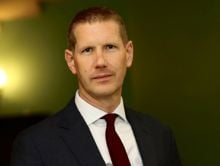 Steven Malby is Deputy Head of Department in Migration Directorate at the Foreign, Commonwealth and Development Office (FCDO), where he currently leads work on international legal framework reform. He was previously Deputy Head of FCDO’s Human Rights Department and the UK Interim Modern Slavery Envoy. Prior to joining the civil service, Steven worked for international organisations, including the Commonwealth Secretariat and the United Nations Office on Drugs and Crime (UNODC) in Vienna.
Steven Malby is Deputy Head of Department in Migration Directorate at the Foreign, Commonwealth and Development Office (FCDO), where he currently leads work on international legal framework reform. He was previously Deputy Head of FCDO’s Human Rights Department and the UK Interim Modern Slavery Envoy. Prior to joining the civil service, Steven worked for international organisations, including the Commonwealth Secretariat and the United Nations Office on Drugs and Crime (UNODC) in Vienna.
Steven will work with the Policy and Evidence Centre on Modern Slavery and Human Rights to bring together academic experts on international human rights law with legal policy officials from FCDO and across the civil service. The aim is create a trusted space for candid and inclusive discussion that can contribute to contemporary debate and policy making, with a focus on the application of the European Convention on Human Rights in the context of modern challenges such as irregular migration.
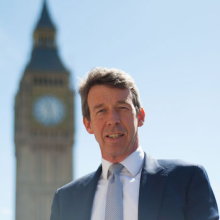 Murray Hunt is Director of the Policy and Evidence Centre on Modern Slavery and Human Rights which since 2019 has sought to generate actionable policy recommendations grounded in both evidence and human rights law in the particular policy area of modern slavery and human trafficking. Murray is a human rights lawyer with a strong interest in bridging the divide between academic research on human rights and human rights law and policy. As an author and lecturer, a practising barrister and a former Legal Adviser to the UK Parliament’s Human Rights Committee, the Joint Committee on Human Rights, Murray has first-hand experience of the worlds of academic research, legal practice and the making of law and policy. The focus of Murray’s current work is how to rebuild the political consensus underpinning the foundational values of the Rule of Law, human rights and democracy in both the UK and the wider world, and thereby secure their long term resilience in the face of the existential threats they face in an age of populism; and how to develop the research and policy infrastructure so that it is capable of generating robust and reliable independent research, evidence and expert analysis to inform the innovative policies that are required to re-legitimate democratic values.
Murray Hunt is Director of the Policy and Evidence Centre on Modern Slavery and Human Rights which since 2019 has sought to generate actionable policy recommendations grounded in both evidence and human rights law in the particular policy area of modern slavery and human trafficking. Murray is a human rights lawyer with a strong interest in bridging the divide between academic research on human rights and human rights law and policy. As an author and lecturer, a practising barrister and a former Legal Adviser to the UK Parliament’s Human Rights Committee, the Joint Committee on Human Rights, Murray has first-hand experience of the worlds of academic research, legal practice and the making of law and policy. The focus of Murray’s current work is how to rebuild the political consensus underpinning the foundational values of the Rule of Law, human rights and democracy in both the UK and the wider world, and thereby secure their long term resilience in the face of the existential threats they face in an age of populism; and how to develop the research and policy infrastructure so that it is capable of generating robust and reliable independent research, evidence and expert analysis to inform the innovative policies that are required to re-legitimate democratic values.
Diogo Martins and Alice Norton
Diogo Martins is a medical doctor and Lead Adviser to the CEO and Chief Strategy Officer at Wellcome, the largest philanthropic organisation in the UK, supporting science to tackle the most urgent global health challenges. Diogo works at the centre of strategy development, impact, organisational planning, and executive decision-making, helping shape priorities, coordinate delivery across teams, and manage key internal and external partnerships across the public, private, and philanthropic sectors.
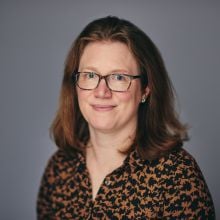 Alice Norton leads the Pandemic Science Institiute’s Policy and Practice Research Group. Alice's group undertakes applied research on the design and implementation of policy and practice for pandemic preparedness and response. She is Scientific Director for the Global Research Collaboration for Infectious Disease Preparedness (GloPID-R), undertaking research and policy development to support global research funders in their preparedness and response to infectious diseases. The Research and Policy team which Alice heads, focusses on a range of research to inform policy and direct policy development. She is also the Academic and Policy Lead for the Africa Pandemic Sciences Collaborative, working with the Science Foundation of Africa and Mastercard Foundation on Pandemic Sciences.
Alice Norton leads the Pandemic Science Institiute’s Policy and Practice Research Group. Alice's group undertakes applied research on the design and implementation of policy and practice for pandemic preparedness and response. She is Scientific Director for the Global Research Collaboration for Infectious Disease Preparedness (GloPID-R), undertaking research and policy development to support global research funders in their preparedness and response to infectious diseases. The Research and Policy team which Alice heads, focusses on a range of research to inform policy and direct policy development. She is also the Academic and Policy Lead for the Africa Pandemic Sciences Collaborative, working with the Science Foundation of Africa and Mastercard Foundation on Pandemic Sciences.
In a rapidly evolving global landscape, decision-makers need approaches that help organisations anticipate multiple futures and deliver meaningful impact. Diogo’s Fellowship will explore how strategic foresight can be designed and used by research funders to strengthen long-term decision-making and public value creation. Drawing on expertise across the University of Oxford, it will seek to generate shared learning on core foresight functions – including horizon scanning, scenario development, and integration into planning and decision-making – to inform institutional strategy in philanthropic organisations.
Charlie Podschies and Fiona Alderdice
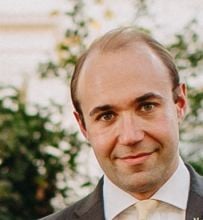 Charlie Podschies is the Policy Lead for Clinical Pathways in the Maternity and Neonatal Programme at NHS England. Charlie leads policy development and national implementation of a range of initiatives to improve maternal and newborn outcomes. Most recently, this includes the Maternal Care Bundle, version 3 of the Saving Babies Lives Care Bundle, and the establishment of Maternal Medicine Networks and Perinatal Pelvic Health Services.
Charlie Podschies is the Policy Lead for Clinical Pathways in the Maternity and Neonatal Programme at NHS England. Charlie leads policy development and national implementation of a range of initiatives to improve maternal and newborn outcomes. Most recently, this includes the Maternal Care Bundle, version 3 of the Saving Babies Lives Care Bundle, and the establishment of Maternal Medicine Networks and Perinatal Pelvic Health Services.
‘Oxford’s National Perinatal Epidemiology Unit is a leading research centre for maternity and women’s health. Over the years, the insights provided by MBRRACE-UK reports have been invaluable in developing NHS maternity policy, and I have also been privileged to work with NPEU researchers on urgent research requirements that have changed practice across England, including the introduction of a universal postnatal GP check for mothers. I look forward to deepening my understanding of the NPEU’s vital work and research community, and broadening discussions between our organisations on how to communicate research most effectively, and how we can ensure that evidence remains at the heart of policy making in NHS maternity care'.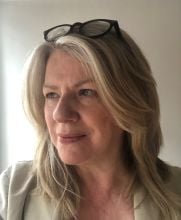 Fiona Alderdice is a senior social scientist at the National Perinatal Epidemiology Unit (NPEU) and Co-Director of the NIHR Policy Research Unit in Maternal and Neonatal Health and Care.
Fiona Alderdice is a senior social scientist at the National Perinatal Epidemiology Unit (NPEU) and Co-Director of the NIHR Policy Research Unit in Maternal and Neonatal Health and Care.
“Maternal and child health is a key UK and global priority. The NIHR Policy Research Unit for Maternal and Neonatal Health and Care (PRU-MNHC) is a multi-disciplinary six-university collaboration led out of the National Perinatal Epidemiology Unit (NPEU) and our research provides evidence to improve the perinatal health and care of mothers, their babies and their families. We are delighted to have this opportunity to work with our Fellow Charlie Podschies, who will bring his policy expertise to our research areas, which include perinatal mental health and understanding and reducing maternal and neonatal health inequities. One of our biggest challenges is ensure our findings reach policymakers in a timely manner. We will explore and develop together innovative approaches to maximise the translation of our research to policy. Staff at all career stages and students across the department will benefit from the fostering of a culture of policy engagement that this Fellowship offers.” says Professor Alderdice.
John Lunan and Madeleine Sumption
John Lunan joined the UK Civil Service in 2014 and has since worked in operations, policy, and private office in the Home Office and Ministry of Justice. He is currently working in migration and borders in the Home Office. He says ' this OPEN Visiting Fellowship at the Migration Observatory provides a valuable opportunity to build stronger relationships with leading academics working on immigration, improving awareness and understanding of policymaking in this crucial area'.
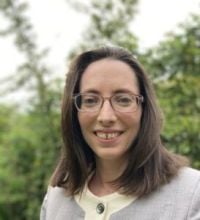 Madeleine Sumption is the Director of the Migration Observatory, which provides evidence-based analysis of migration in the UK. Madeleine’s research interests include the design of immigration policies and their economic and social impacts, labour migration, and the interaction between the economics and politics of migration policies. Madeleine is a member of the Migration Advisory Committee, an independent panel that advises the UK Government on migration issues.
Madeleine Sumption is the Director of the Migration Observatory, which provides evidence-based analysis of migration in the UK. Madeleine’s research interests include the design of immigration policies and their economic and social impacts, labour migration, and the interaction between the economics and politics of migration policies. Madeleine is a member of the Migration Advisory Committee, an independent panel that advises the UK Government on migration issues.
The 2025 Visiting Fellows and their Academic Partners
A pilot scheme, which ran from March to September 2025, enabled seven departments and units to host Visiting Fellows.
Alex Pykett, Jennifer Altehenger, and Martin Conway
Alex Pykett is Deputy Head of China Department at the Foreign, Commonwealth & Development Office (FCDO). He has previously been posted to New Delhi and Prague and has worked across a range of political and security issues, with a particular focus on Asia and Europe. Interested
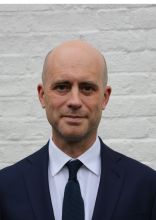 in new perspectives and research trends in history, he will be working principally with the History Faculty, as well as exploring interdisciplinary links that might inform contemporary foreign policy issues and policy-making in government. He has been keen to look at how a closer understanding of government might assist established and aspiring academics, and how their work can benefit policy formation and organisational improvement in the Civil Service.
in new perspectives and research trends in history, he will be working principally with the History Faculty, as well as exploring interdisciplinary links that might inform contemporary foreign policy issues and policy-making in government. He has been keen to look at how a closer understanding of government might assist established and aspiring academics, and how their work can benefit policy formation and organisational improvement in the Civil Service.

Jennifer Altehenger is Associate Professor of Chinese History, and the Jessica Rawson Fellow in Modern Asian History at Merton College. Having started as a historian of modern Chinese law, she is now completing a project on the global history of light industry and design (from policy to manufacturing) in the People’s Republic of China. This work has involved collaborations with museum curators, industrial design professionals, and schools, thus giving her opportunities to connect with non-academic audiences.
Together with Martin Conway, she co-hosted Alex’s fellowship. This is a particularly important time for the faculty to host a policy professional with extensive knowledge of Asia and Europe. The faculty has expertise in a range of subjects – including global history, the history of international relations, security, law, the environment, science and medicine – and this fellowship will be a chance to explore how these fields might benefit from and contribute to policy development. During the fellowship, the hosts ran workshops to introduce students and postholders to Alex’s work and the world of policy-making, and organised events to bring policy professionals and historians into conversation about how to build bridges between different kinds of expertise.

Martin Conway is Professor of Contemporary European History, and a fellow of Balliol College. His published work has covered different aspects of the socio-political history of twentieth-century Europe, including books on Catholic Politics, Political Legitimacy, and Democracy in Western Europe after 1945. He is currently working on a study of male citizenship in twentieth-century Europe. As co-host of Alex, Martin is keen to use this opportunity to strengthen links between the History Faculty and the FCDO at a time of rapidly evolving diplomatic and political contexts.
Helena Dodd and Alice Norton
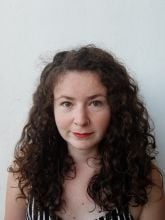
Helena Dodd heads up governance, performance and advises on biosecurity for the UK Integrated Security Fund. This uses a whole-of-government approach to find creative solutions to the most complex national security challenges outlined in the Integrated Review Refresh 2023.
Helena is interested in prioritisation of research and programming efforts to ensure maximum impact, value for money and increased UK resilience towards biological threats. Helena aimed to use this OPEN Visiting Fellowship as an opportunity to strengthen collaboration with academics and explore new mechanisms to incorporate expert advice into policymaking.
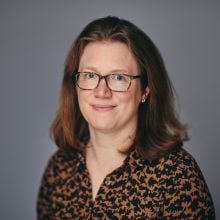
Alice Norton is an Associate Professor leading the Pandemic Sciences Institute Policy and Practice Research Group. Her group undertakes applied research on the design and implementation of policy and practice for pandemic preparedness and response. Alice is also Scientific Director of the Global Research Collaboration for Infectious Disease Preparedness undertaking research and policy development to support global research funders in their preparedness and response to infectious diseases and is the Academic and Policy Lead for the Africa Pandemic Sciences Collaborative. Alice also acts as a Course Advisor on the MSc International Health and Tropical Medicine, leading the policy and evaluation modules and is on the OPEN Steering Group.
Alice is interested in approaches to research prioritisation and how academics can support policy decision making on biosecurity and hopes that the fellowship will result in greater connections in these areas.
Tommy Wise and Sara Shaw

Tommy Wise is the Policy Lead for Care Technology at the Department of Health and Social Care (DHSC). Currently, his work is to lead the development of ‘new national standards and trusted guidance’ for care technology, a government commitment announced in January 2025. Tommy joined the civil service as an analyst, working on areas such as social care reform and UEC performance, before becoming a Private Secretary to the Permanent Secretary at DHSC and now policy lead for Care Technology.
During the fellowship, Tommy worked with researchers at the Nuffield Department of Primary Care Health Sciences and more widely, to strengthen the links between academia and policy-making. Areas of focus included: approaches to digitally enabled social care, how to generate effective evidence in care technology evaluations and adapting health economic approaches to social care. The fellowship also included convening partners from across the care sector to discuss how technology and digital can be harnessed effectively.

Sara Shaw is Professor of Health Policy & Practice in the Nuffield Department of Primary Care Health Sciences, where she leads a programme of work on the organisation and delivery of health and social care, including the role of technology in shaping care. She is Director of DECIDE, an NIHR-funded rapid evaluation centre focused on technology-enabled remote monitoring across health and social care, which generates policy-relevant evidence to support real-world adoption and scale.
The OPEN Visiting Fellowship provided an opportunity to build on work that Sara’s team, and the wider department, are conducting around digitally-enabled care; identifying evaluation priorities relating to the adoption, spread and scale of digital technology in the specific context of social care; and building knowledge and skills amongst the team about engaging with the digitising social care landscape and those developing and implementing related policy.
Helen Tattam, James Robson and Xin Xu
 Helen Tattam is a Strategy Lead within the Department for Education’s Skills Strategy Unit. She joined the DfE in March 2022, after working for over a decade at the University of Sheffield. Helen initially entered DfE as a senior policy adviser focused on further education oversight, and then moved into the Skills Strategy and Engagement Division to develop her interest in wider post-16 skills system strategy. Helen is also one of the DfE leads for the ‘Sheffield Policy Campus’, which aims to maximise the major Civil Service policymaking presence in the Sheffield and wider South Yorkshire region, including through the development of a knowledge exchange and policy collaboration framework, to enable government departments, experts and stakeholders in the region to work together on cross-cutting issues more routinely. Helen’s visiting policy fellowship with the Centre for Skills, Knowledge, and Organisational Performance (SKOPE) therefore had a dual focus, seeking to support the development of the government’s long-term post-16 education and skills strategy (announced in Labour’s manifesto) via engagement with SKOPE’s latest research, and to test ways of joint working between the Skills Strategy Unit and SKOPE in order to develop a plan for ensuring ongoing policy collaboration.
Helen Tattam is a Strategy Lead within the Department for Education’s Skills Strategy Unit. She joined the DfE in March 2022, after working for over a decade at the University of Sheffield. Helen initially entered DfE as a senior policy adviser focused on further education oversight, and then moved into the Skills Strategy and Engagement Division to develop her interest in wider post-16 skills system strategy. Helen is also one of the DfE leads for the ‘Sheffield Policy Campus’, which aims to maximise the major Civil Service policymaking presence in the Sheffield and wider South Yorkshire region, including through the development of a knowledge exchange and policy collaboration framework, to enable government departments, experts and stakeholders in the region to work together on cross-cutting issues more routinely. Helen’s visiting policy fellowship with the Centre for Skills, Knowledge, and Organisational Performance (SKOPE) therefore had a dual focus, seeking to support the development of the government’s long-term post-16 education and skills strategy (announced in Labour’s manifesto) via engagement with SKOPE’s latest research, and to test ways of joint working between the Skills Strategy Unit and SKOPE in order to develop a plan for ensuring ongoing policy collaboration.

James Robson is Director of SKOPE, Associate Professor of Tertiary Education Systems and Director for Research at the Department of Education. He is also a co-investigator for the Centre for Global Higher Education. James’ research focuses on the political economy of Tertiary Education systems, bringing together key interests in the nexus of education and employment, the critical study of skills supply and demand, research eco-systems, access, social justice and sustainability. He has received major funding from the ESRC, the AHRC, the GCRF, the Edge Foundation, the Royal Society, the British Academy, the Office for Students and Research England.

Xin Xu (许心) is a Departmental Lecturer in Higher/Tertiary Education. She is a Fellow of the Higher Education Academy (FHEA). Her research concentrates on higher/tertiary education and research including tertiary education and research policy, governance, and assessment; global dynamics and internationalisation of tertiary education and research, including cross-border academic and knowledge mobility; and other areas of research on research, including research culture, value and ethics. Projects she currently works on include the CGHE project ‘Research on Research: the research function and mission of higher education’, a project named ‘International academics in mainland China’, and on ‘Ethical research in international and comparative education during Covid-19’.
Jessica Lawrence and Jonathan Pugh

Jess Lawrence is a UK civil servant, working in the Cabinet Office. Her current role is in the COBR Unit where she prepares for and responds to short-notice national-level crises, such as widespread flooding and human disease outbreaks, that severely impact the lives of people in the UK and British citizens overseas.
Jess is interested in how ethics can be consciously brought into government decision-making in crisis situations. When making big policy changes in normal time, government carries out impact assessments to understand the likely outcomes of the policies it may implement. Crises, however, accelerate and distort policy-making for a range of practical, economic, psychological and social reasons, meaning it can be harder to use the normal processes for assessing new policy under the very tight time constraints and considerable pressure. Jess was excited to be working with academics at the Uehiro Institute and drew on their expertise in practical ethics to develop a useable framework to guide decision-makers in their consideration of ethics in crisis.
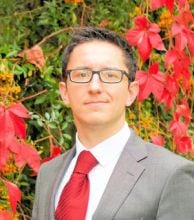
Jonathan Pugh works in philosophical applied ethics and is interested in how we can use the tools of moral philosophy to address complex policy questions. He was previously a member of the UK Pandemic Ethics Accelerator, and has published work in philosophical and medical journals on a number of topics in public health ethics, the ethics of psychiatry, clinical ethics, research ethics and the ethics of neuroscience.
He and his Uehiro colleagues were excited to learn more from Jess about precisely how crucial policy-making decisions are made, and to think of new ways in which the Uehiro Institute’s work could usefully be brought to bear on the policy-making sphere. Jess’ policy experience on a number of pressing issues overlaps with the research interests of many Uehiro researchers.
“I have no doubt that Jess’s insights will help us all improve the ways in we can try and make our work impactful for policy. In return, I am confident that we can offer something useful in helping her to further explore the value of a philosophical approach to addressing the ethical questions that continue to arise in policy-making.”
Jonathan Pugh
Rex Amos and Sadie Creese
Rex Amos is based in the Foreign, Commonwealth and Development Office. He has worked for HM Diplomatic Service across the international arena including in multilateral, bilateral, crisis management, programme and policy roles. Rex served in Afghanistan, worked with NATO and has had responsibility for strategic threats including nuclear and cyber. This fellowship explored how academia, industry and the national security community can collaborate to manage the strategic implications of AI security. The fellowship considered how we can promote cross-sectoral collaboration, the learning of lessons from other domains and offer recommendations to ensure that our decision-making processes are well informed and keep pace with technological developments.
Sadie Creese is Professor of Cyber Security in the Department of Computer Science. She teaches operational aspects of cybersecurity including threat detection, risk assessment and security architectures. Her current research portfolio includes: threat modelling and detection with particular focus on AI, visual analytics for cybersecurity, risk propagation logics and communication, resilience strategies for business, privacy requirements, vulnerability of distributed ledgers and block-chains, understanding cyber-harm and how it emerges for single organisations, nations and the potential for systemic cyber-risk, and the Cyber Security Capacity Maturity Model for Nations.
Sadie is the founding Director of the Global Cyber Security Capacity Centre (GCSCC) at the Oxford Martin School, where she continues to serve as a Director conducting research into what constitutes national cybersecurity capacity, working with countries and international organisations around the world. Prior to returning to academia, she worked as a cybersecurity expert in business and as a research scientist specializing in security for the UK’s Ministry of Defence.
“The GCSCC looks forward to hosting the inaugural OPEN Visiting Fellowship and leveraging this opportunity to develop more robust and sustainable mechanisms for engagement between the cybersecurity research community and policymakers, thereby enhancing our collective impact.”
Sadie Creese
Joseph Lowe and E.J. Milner-Gulland

Joseph Lowe worked for 18 years in HM Treasury. He advised across all of government, at all levels, from Department heads to policy advisers and analysts, including looking after the UK government’s methodology for appraising and including social value in policy implementation.
Now having left the civil service he is hosted by the University of Oxford Interdisciplinary Centre for Conservation Science, working with colleagues engaged in academic research across the University, Land, Environment, Economics and Policy Institute (LEEP) at Exeter and the academic community more widely. His objective is to assist bringing the academic community together with government, business and industry to develop and implement practical ways of taking biodiversity and climate change into account in developing and implementing public policy.

E.J. Milner-Gulland is the Tasso Leventis Professor of Biodiversity. Her research group, the Interdisciplinary Centre for Conservation Science, undertakes a wide range of research, outreach and engagement projects, on five continents and in both marine and terrestrial settings. These include developing and applying methods for understanding, predicting, and influencing human behaviour in the context of local resource use in developing countries, and working with businesses to improve their environmental and social sustainability. Her team also works on controlling the illegal trade in wildlife and on designing, monitoring and evaluating conservation interventions in order to improve their effectiveness.
E.J.’s team were keen to learn from Joseph on the workings of government, and to help them think through how best to ensure that the value of biodiversity is recognised and embedded within government. They hope that by working with Joseph they will be able to make a meaningful contribution to the policy discourse at this critical time when a number of relevant pieces of legislation are in process.